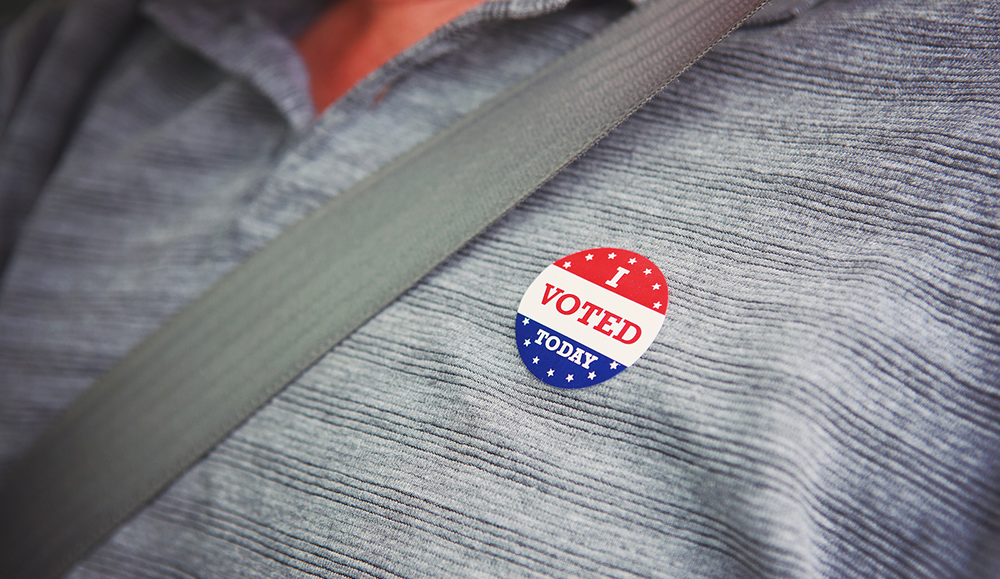Benefits on the Fringe: Paid Time Off for Voting in Elections

Welcome toBenefits on the Fringe, the monthly Recruiter.com column where Jason McDowell covers the most unique benefits today’s employers are using to woo talent, as well as advances and innovations in the employee benefits realm.
Voting is arguably the most important civic responsibility of any citizen living in a democracy, yet voter turnout in the United States is typically much lower than in other developed democracies. Many American voters are disenfranchised by a polarized political environment, while some simply have no interest in the political process. For others, gerrymandering and other partisan political games have made voting too difficult. Purging of registered voters, voter ID laws, and registration deadlines have also made it more challenging for the average voter to get to the polls.
Business leaders can address some of these challenges with one simple benefit : Give employees paid time off to vote.
I Was Going to Vote, But I Didn’t Have Time
Whether you let workers come in late, leave early, take long lunches, or go all the way and offer Election Day as a paid holiday, giving employees time to vote without making a financial sacrifice can have a noticeably positive impact on your corporate culture, according to new data from employee wellness consultants OC Tanner.
Of the 1,064 US employees OC Tanner surveyed, 61.9 percent said their employers give them flexibility to leave the office to vote during the workday, while 34.1 percent said they were given paid time off to vote. OC Tanner did find a disparity between hourly and salaried employees in this regard: While 68.8 percent of salaried employees said their companies gave them flexibility to vote, only 53.4 percent of hourly employees reported the same.
Voting is undoubtedly important to many if not most of your workers. If your company doesn’t support these workers in casting their ballots, that could damage how your employees feel about working for your organization. Employees who feel their needs are ignored by company leaders tend to be less productive and less happy in the workplace.
“Employees who feel that their employers care about their overall well-being — emotional, social, physical, and financial — report high feelings of well-being,” says Gary Beckstrand, vice president at the OC Tanner Institute. “Historically, most employers have focused primarily on improving the physical wellness of their employees. Organizations that have expanded into other areas, including social and emotional wellness, are seeing significant improvements in overall well-being. Allowing employees time to vote is a simple way to acknowledge and support social and emotional wellness.”
What Does the Company Get Out of It?
Offering paid time off to vote is an effective, low-cost way to let employees know you care about their overall well-being, according to Beckstrand.
“When employees feel cared for, they are more engaged and less likely to leave an organization,” he adds. “It reinforces a workplace environment where employees choose to stay and do their best work.”
Beckstrand also notes that, in the current political climate, voters are energized, and turnout is likely to be historically high this Election Day.
“Encouraging employees to exercise their right to vote will not only benefit the organization, but also set a precedent for ongoing participation in the electoral process — creating a positive, lasting impact,” Beckstrand says.
That said, employers must keep their own political bias out of it. “The focus needs to be on supporting employees’ desire to participate with no strings attached,” Beckstrand says.
Beyond its affect on existing employees, paid time off for voting can benefit a company’s recruiting initiatives as well.
“Employees who work for an employer that offers flexibility on voting day were 141.7 percent more likely to recommend their organization as a great place to work, as compared to employees who reported working for a company that does not offer flexibility to vote on voting day,” Beckstrand says. “Employees who reported that their companies offer paid time off to vote were 232.5 percent more likely to recommend their organization as a great place to work, versus those employees who reported working for an organization that does not offer paid time off to vote.”
And paid time to vote can have one final desirable effect: Your workers will feel heard.
“When an employee is offered the flexibility to vote, they are 81.6 percent more likely to feel like they help influence important decisions at work,” Beckstrand says. “This suggests that when employers encourage employees to enact their civic right to vote … that employer also engenders and fosters an overall feeling of influence in their day-to-day work. Such feelings of influence impact employee engagement in a positive way.”
The benefits of offering paid time off to vote are easy to achieve and require very little on the part of the employer. In addition, if employees choose not to use the benefit, the company loses nothing.
“While many employees could cast absentee ballots or vote before/after working hours, allowing them flexibility sends a powerful message regarding how the organization feels about employees and the local/national communities in which they do business,” Beckstrand says. “More and more employers are realizing the importance of creating workplace cultures that create a positive employee experience … [and] acknowledge the whole person — what they bring to the company and the community. Allowing employees time to vote during working hours is a relatively easy and cost-effective way to communicate that the company cares. It’s often the simple things that have the biggest impact.”

